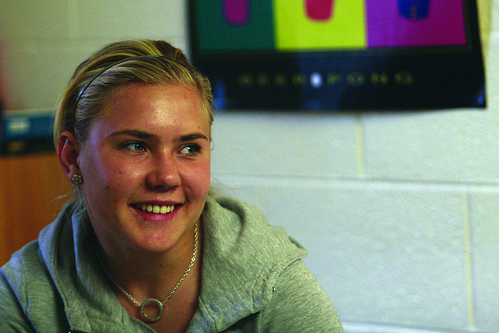When Sameep Vijayvergiya set foot in Philadelphia from India to study at the Beasley School of Law, he did what any practical person would do: began looking for a place to live. Vijayvergiya was thrilled to be in the United States. At Temple, he would finally be able to expand his horizons and hone his skills as a lawyer.
Before attending Temple, his friend warned him about crime in North Philadelphia.
“I was like, ‘what?’” Vijayvergiya said. “I actually land in a city in the U.S. and that city has the highest crime rate? Cool.”
Vijayvergiya now lives near Main Campus and said he thinks there is little to be worried about.
Philadelphia living has been a culture shock for many international students.
Second-year graduate student Wenjie Wang, who is from China, said she was surprised when people called her “baby” while she was walking down the streets even though she had no clue who they were.
Sisi Zhang, also from China, was overwhelmed by Philadelphians’ reactions to the Phillies’ winning the World Series.

“The Chinese get excited,” said Zhang, who is a first-year graduate student, “but never like that.”
Both Wang and Zhang said they were fortunate to be able to study in the States, considering Wang is from an area of China where a lot of illegal immigrants flock to the United States, and it is not easy for the Chinese to obtain visas.
It’s also not easy for foreign students to maintain their visas.
Bassem Yousri, a graduate student from Egypt, has been in the United States for two years but may not be able to stay much longer when he graduates from the Tyler School of Art this May, despite his accomplishments in this country.
Yousri left Egypt as a promising artist after he received his undergraduate degree and obtained a nine-month scholarship to study in the United States. The scholarship included six months at Drexel University and a three-month internship in New York for famed fashion designer Diane von Furstenberg.
At the end of his internship, Yousri chose between several arts programs to pursue his graduate degree in painting.
“Tyler School of Art was a priority for me,” Yousri said. “I wanted to stay in Philadelphia, and Tyler was simply the best program.”
Temple has drawn 1,528 international students from 118 countries this year, mostly due to the opportunities the American higher education system has to offer.
“Temple’s psychology program is of great quality,” said junior psychology major Gisella Hilliman, who grew up in St. Martin, a small island in the Caribbean. “[The program] has high standards, and it is challenging.”
Leaving for college is hard enough, but leaving one’s homeland is even more difficult, especially if newcomers are not used to American culture.
“The level of life here is much better, and the middle class here would be rich in Egypt,” said Yousri, who lived in a small apartment, a common living space for working-class families in Egypt.
While the United States has often been viewed as a richer land, there is no doubt that parts of Philadelphia do not match that standard.
The Chinese tend to have the misconception that the United States is rich, Zhang said. After walking a few blocks in Philadelphia, she realized this wasn’t always the case.
Like Philadelphia, there are many rich, but also many impoverished areas in India.
“India is so diverse,” Vijayvergiya said. “Within the same city you can find extremes.”
Coming to a city like Philadelphia wouldn’t be as extreme for a Chinese student from Shanghai since the city is so developed, but the States are not a clone of China, especially when it comes to the food.
Ecstatic at the sight of Chinese restaurants around Temple’s campus, Zhang thought she would still be able to enjoy the appetizing flavors of the food from her homeland. Instead, she tasted just one tang in her mouth: sweetness.
“American Chinese food has so many different names,” Zhang said, laughing. “But they are all the same.”
Ashley Nguyen can be reached at ashley.nguyen@temple.edu.



Be the first to comment